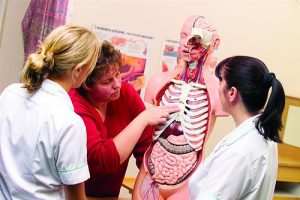
The face of the nursing profession is changing as as healthcare morphs into a new paradigm of care for the twenty-first century. The number of nursing positions in hospitals has declined and there has been a shift to more community-based positions that define new models of nursing care. In order to prepare new nurses for what will eventually be the majority of available positions, nursing education will need to change.
In 2009, the Institute of Medicine and the Robert Wood Johnson Foundation developed a joint initiative known as the Future of Nursing (FON). Of the three national forums FON held, one focused entirely on nursing education. Attendees considered nursing education reforms in nursing curricula, teaching methods, and the best venues for learning.
Participants formulated recommendations that reflect the new realities of delivering effective nursing care based on the following concepts:
– Nursing care is becoming more outpatient- and community-centered, and fewer nurses are employed in acute care settings.
– Evidence-based nursing practice guidelines, which evolve rapidly, are not integrated effectively into actual nursing practice and nursing education.
– Nurse leaders and team-led nursing care are growing needs.
– Simply increasing the number of nurses will not meet the growing demand for their services.
Michael Bleich, RN, Ph.D, Dean of the Oregon Health & Science University School of Nursing explained that the FON participants did not believe the current system of nursing education inadequately prepared new nurses. He did indicate that patients’ needs are more complex these days, especially in the aging populace, and that more than simply ensuring that a patient lives, nurses need to focus on helping a patient maintain or improve his or her quality of life.
Nursing practice needs to shift from a diagnosis-focused approach to one that meets the needs of a population with complex medical issues. Nurses need to pull from a host of interventions that patients can perform themselves in order to protect their health and be able to live with their medical issues.
To add to myriad of nursing duties already required, the entire healthcare system also looks to nurses to maintain and contribute to the safety requirements of the facilities. The latter is focused more on being an effective healthcare team member using skills not taught in nursing education, such as those better performed by facilities management.
The FON forum identified another challenge facing nursing education — encouraging diversity among nursing students. Better recruiting techniques that appeal to racially-ethnic groups and the male population must be deployed in order to provide culturally-effective care. This has been an ongoing issue in nursing for the past two decades.
